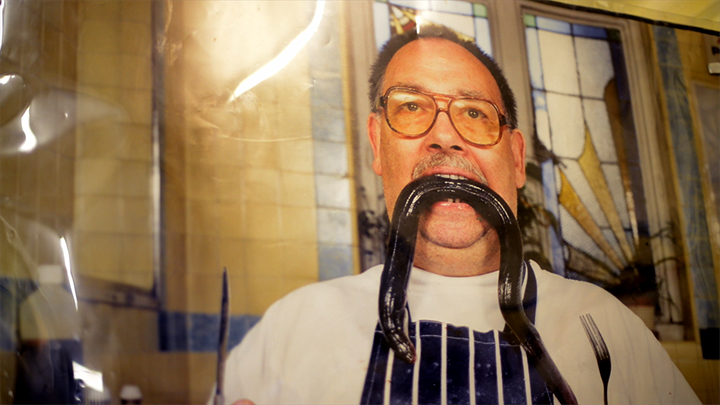Pie-oneers of fast food
As a kid in the 90s, whenever we visited my Granddad at the family home in Leyton, it became a habit to stop off en route at a pie mash shop. We’d drive via the North Circular from suburban trappings where the precursors to today’s identikit high streets – Burger King, Our Price, Dixons and Woolworths – had taken root. From a menu solely comprised of ratios of beef mince pie to mash, the only necessary choice is whether to go for the single ‘one and one’ or plump for a double. Sitting on immovable chairs we’d top vast bowls of luminous green parsley liquor with chilli vinegar from the pierced lids of vodka bottles, occasionally daring to try the traditional trimming of jellied eels.
For a six-year-old it was a peculiar experience. If the past is a foreign country then pie mash shops with their ornately-tiled walls with photos of Pearly kings and queens and great tanks of writhing eels spoke of especially exotic climes of London’s history. European Eels begin their life as larvae in the depths of the Sargasso Sea, undergoing various stages of metamorphosis during a three-year passage along the Gulf Stream to the freshwater rivers of Europe. Able to survive in almost any water and resilient to the industrial filth of the mid-eighteenth century Thames, the jellied variety of the cheap and plentiful serpentine fish became a Cockney staple. During the Victorian era, they would be plucked from estuarine mud flats and shipped live to eel pie purveyors, landing finally on the working class dinner plates of some of London’s oldest fast food outlets.
M. Manze’s pie mash shop in Walthamstow, which opened in 1929, was awarded Grade II listed status in October last year, and whilst many of the buildings themselves are remarkable, the people that populate them – the staff, the owners and the customers – are what keeps these pockets of history breathing. Before cameraman Chris Brunner and I set out to document them through a series of interviews we were weary of a predictable narrative bemoaning the loss of a bygone era. Instead we found an industry on the wane perhaps but by no means in decline.
A century since the pie mash hey day, owners three or four generations deep into the business, who share their name with their shops, have willing inheritors of the family recipes. Far from an obscure tourist curiosity, patrons enjoying a ritual family expedition or lining the stomach before a day at the Millwall pack the places on Saturdays. Though we didn’t get to meet him, apparently Leytonstone lad David Beckham still pops into his favourite shop in Waltham Abbey for a two and two. The European Eel is classified as critically endangered, but recent signs suggest the decline has halted or even reversed. Like their wares, the institution that is pie mash continues to endure, nourishing London’s Cockney soul. Make mine a double.

